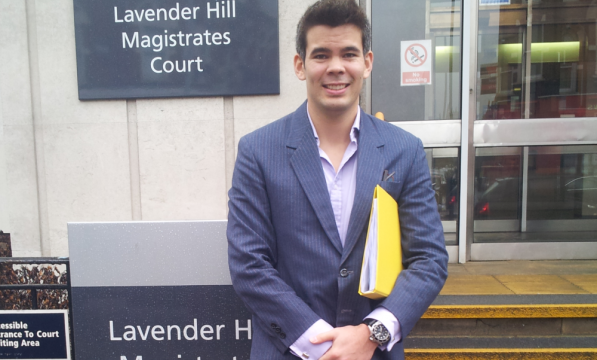CPS drops fixed penalty notice prosecution

The cyclist, Alex Paxton, challenged the fixed penalty notice (FPN) with support from the charity the Cyclists’ Defence Fund (CDF), which provides guidance on the law relating to cycling and assists with fighting legal cases which could clarify the law.
Mr Paxton was given the FPN by a police officer on Fulham High Street in London in August after he failed to stop behind the second stop line of an advanced stop zone (aka the cycle box). He could not stop safely within the cycle box because it was occupied by a car.
'Insufficient evidence'
The Crown Prosecution Service (CPS) dropped the case this week on the grounds that there was insufficient evidence for a realistic prospect of a conviction.
The news that the CPS has decided to discontinue proceedings comes in the same week as reports that the Metropolitan police have been ordered to fine at least 10 cyclists a month, in the wake of the recent tragedies in London.
It's very important that any cyclist who finds themselves in a similar situation is aware of their rights, and their ability to challenge a Fixed Penalty Notice or a prosecution in such circumstances, so that we can all ensure that the law is applied appropriately and targeting the right people."
Miss Puneet Rai, Thomas More Chambers
Miss Puneet Rai, of Thomas More Chambers, who acted for Mr Paxton, said, "I am very pleased common sense has prevailed and that the Crown Prosecution Service has made the right decision! It's great news for Alex, for CDF, and cyclists generally. In making this decision the CPS clearly accepted that in the circumstances Alex had no real option than to act as he did to ensure his own safety. Clearly road traffic laws have to be obeyed but not to the point that cyclists are forced to place themselves in danger in order to do so."
Assistance from CDF
Mr Paxton decided to challenge the FPN after receiving advice from CDF and confirmation that the charity would help with his legal costs. Over £2,500 was raised from individual donors to support the legal challenge.
I hope the decision encourages the police to engage with cyclists in a positive way rather than resorting to fixed penalties."
Alex Paxton
CDF urged the CPS to drop the case by writing a letter expressing its support for Mr Paxton’s challenge and questioning the intention to prosecute. The letter was co-signed by six organisations: CDF, CTC the national cycling charity, the London Cycling Campaign, Sustrans, RoadPeace and British Cycling.
Mr Paxton said, "I hope the decision encourages the police to engage with cyclists in a positive way, wherever practically possible, rather than resorting to fixed penalties. I would like to thank the Cyclists' Defence Fund and the other organisations who supported my challenge and, of course, everyone who donated to make the whole thing possible.'
Advanced Stop Lines / Cycle Boxes
The purpose of ASLs, or cycle boxes, is to give cyclists priority at junctions, where around 75% of cyclists’ collisions occur. ASLs help cyclists control their own safety as they prepare to manoeuvre through a junction by enabling them to position themselves where they are clearly visible to the drivers behind them and allowing them to move off in front of other traffic without being cut up by turning vehicles.
Being cheap and cost-effective, ASLs are popular cycle safety measures in the UK, but they are in no way perfect. For instance, the law states that cyclists can only legally enter cycle boxes via a feeder lane.
This is problematic for two reasons, 1) cyclists cannot enter ASLs legally where the boxes have been designed without a dashed road marking or feeder lane (these kinds of ASLs do exist); 2) where there is a central feeder lane between two lanes of traffic, left-turning cyclists are required to use that lane even if there is space for them to filter past traffic in the nearside lane, with obvious dangers if the lights change before they get there.
CTC wants to see better enforcement of the first stop line – if this was enforced (preferably by camera) vehicles would not enter the boxes, and people wouldn’t have to pull ahead of the further stop line to remain safe.
When FPNs for footway cycling were introduced in England and Wales, several cycling organisations, CTC included, asked for assurance from the Government that the penalty would be applied fairly and only be used when cyclists’ behaviour put pedestrians at risk.
The then Home Office Minister, Paul Boateng MP, confirmed in writing in a now well-known quote: “The introduction of the fixed penalty is not aimed at responsible cyclists who sometimes feel obliged to use the pavement out of fear of the traffic, and who show consideration to other pavement users when doing so. This is not a clamp down on responsible cycling, and I know the police service too do not see it in that way.”
The same discretion that the police are expected to use when issuing FPNs for pavement cycling should also be applied when issuing FPNs to cyclists who fail to stop at ASLs and this should be reflected in ACPO guidance to police officers.
The Cyclists' Defence Fund

